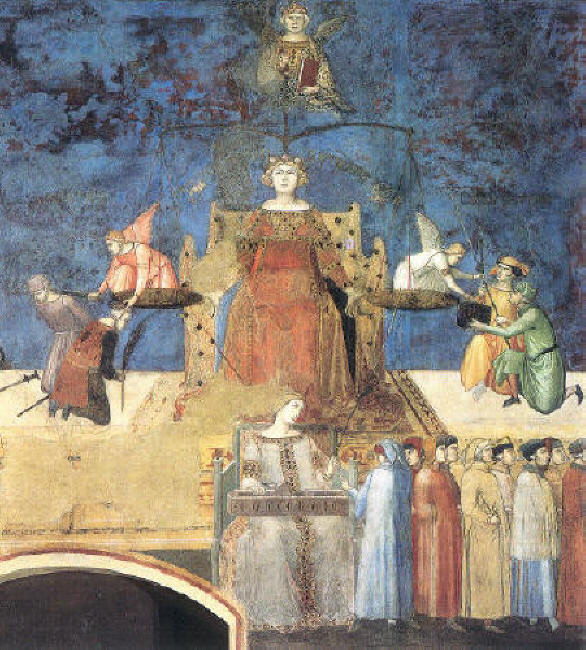
Ambrogio Lorenzetti, Justice, Palazzo Pubblico, Siena, ca. 1340 A.D.
Higher Norms in the
Ius commune: Justice,
Rights, Equity, Consent,
Innocence, Due
Process could "trump"
Positive Law
1469: Pope Paul II: "Justice ought to be common to all, Christian or Jew" S. Simonsohn, The Apostolic See and the Jews 1464-1521 p. 1164
1482: Pope Sixtus IV mandated that Jews had a right to a trial and a defense S. Simonsohn, The Apostolic See and the Jews 1464-1521 p. 1284-1287
1535: Pope Paul III: "no one including Jews should be deprived of a legal defense, which is established by the law of nature" S. Simonsohn, The Apostolic See and the Jews 1522-1538 p. 1191
The right to a defense, to a lawyer, and to the means to conduct a defense was an obvious extension of the rights enshrined by the maxim "Innocent until Proven Guilty." Due process was established by Ius naturale.
1469: Pope Paul II: "Justice ought to be common to all, Christian or Jew" S. Simonsohn, The Apostolic See and the Jews 1464-1521 p. 1164
1482: Pope Sixtus IV mandated that Jews had a right to a trial and a defense S. Simonsohn, The Apostolic See and the Jews 1464-1521 p. 1284-1287
1535: Pope Paul III: "no one including Jews should be deprived of a legal defense, which is established by the law of nature" S. Simonsohn, The Apostolic See and the Jews 1522-1538 p. 1191
The right to a defense, to a lawyer, and to the means to conduct a defense was an obvious extension of the rights enshrined by the maxim "Innocent until Proven Guilty." Due process was established by Ius naturale.
Ken Pennington, "Innocent Until Proven Guilty:The Origins of a Legal Maxim," 63 The Jurist (2003) 106-124 and slightly revised in The Penal Process and the Protection of Rights in Canon Law: Proceedings of a Conference Held at the Pontifical University of the Holy Cross, Rome, March 25-26, 2004, edited by Patricia Dugan (Collection Gratianus Series; Montréal: Wilson & Lafleur, 2005) 45-66.